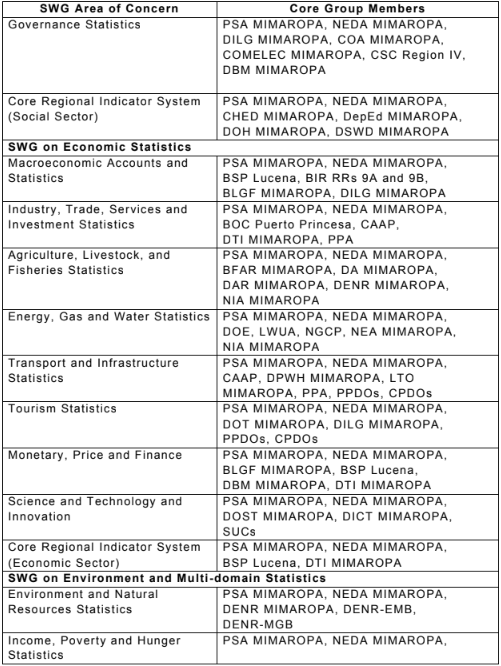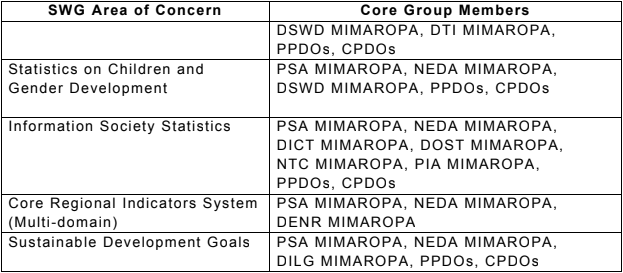TERMS OF REFERENCE
The Sectoral Working Groups (SWGs) are created in order to discuss, formulate , and deliberate on each chapter of the MIMAROPA RSDP 2023-2029 and to facilitate the implementation of various statistical development programs stated in the MIMAROPA RSDP 2023-2029.
I. Functions and Responsibilities of SWGs
The Sectoral Working Groups (SWGs) shall have the following duties and
responsibilities:
1. Conduct meetings, consultations, and workshops on the sector’s conceptual/statistical framework, situational analysis, and statistical developments, best practices, and milestones for CYs 2018-2022.
2. Serve as a venue for the exchange of views and expertise to resolve identified statistical issues and challenges arising from the innovation, production, dissemination, and use of statistics stated in the MIMAROPA RSDP 2023 -
2029.
3. Advise the RSC on setting regional policies and direction on statistical development and innovation and reflect these in the relevant chapters and sectors of the MIMAROPA RSDP 2023-2029.
4. Provide an overall direction in the technical review, editing, and finalization of the write-up of the RSDP chapter/sectors under jurisdiction.
5. Serve as a venue for the monitoring of the implementation of statistical development programs (SDPs), with the support of Regional Line Agencies (RLAs), Local Government Units (LGUs), State Universities and Colleges
(SUCs), and other stakeholders.
6. Recommend policies or actions that may be adopted by the RDC MIMAROPA to stimulate an innovation-driven economy in the region.
7. Recommend to the RSC MIMAROPA, RDC MIMAROPA, and the PSA Board an efficient workable scheme for the allocation of budget of concerned agencies for the implementation of SDPs for each calendar year.
8. Recommend to the RSC MIMAROPA, RDC MIMAROPA, and the PSA Board appropriate measures for the improvement of local-level statistics in MIMAROPA, including the statistical frameworks, methodologies and
processes for the generation and dissemination of statistics.
9. Address evolving and emerging statistical requirements of stakeholders in the MIMAROPA Regional Statistical System through thorough discussion and brainstorming.
10. Prioritize outputs for the implementation of SDPs stipulated in the MIMAROPA RSDP 2023-2029, especially those that are required to monitor the progress of the development programs set forth in the MIMAROPA
Regional Development Plan 2023-2028.
11. Submit to the RSC MIMAROPA their consolidated annual work programs and progress report of their work, including findings , best practices, challenges and recommendations on technical issues referred to them.
II. Members of the Core Group
1. The membership to SWGs is open to, but not limited to the following:
a. Government institutions such as RLAs, GOCCs, LGUs, and SUCs that generate statistical data through their administrative recording systems, registers, surveys, and censuses.
b. Private institutions such as Non-Government Organizations (NGOs), private higher education institutions (HEIs), enterprises, and corporations that produce complementary statistical data which are critical in the monitoring of statistical indicators in the following:
Regional Development Plan-Results Matrices, Core Regional Indicators
System, Core Regional Sustainable Development Goals Indicators ,
Cities and Municipalities Competitive Index, and in the Compendium of
Environment Statistics, among others.



2. Officers of the each SWG are as follows:
a. The Chairperson shall be elected from the core group members of each SWG. A member agency can assume as Chairperson of only one SWG.
b. The Chairperson shall:
i. Take charge in the overall management and operation of the SWG.
ii. Spearhead semestral meetings and other activities for the fulfilment
of the objectives of RSC MIMAROPA and RSDP MIMAROPA.
iii. Support technical and logistical for all activities of the SWG.
iv. Provide technical support to the RSC MIMAROPA.
c. PSA MIMAROPA, represented by its Regional Director, shall act as the SWG Vice Chairperson. PSA MIMAROPA shall act as presiding officer in the absence of the SWG Chairperson.
d. The staff from the Statistical Operations and Coordination Division of
PSA MIMAROPA shall serve as Secretariat for all SWGs. The Secretariat shall be responsible for the following:
i. Organize semestral SWG meetings, and special meetings should the need arise.
ii. Provide technical and logistical support for all activities of the SWG and to the RSC MIMAROPA.
iii. Disseminate and follow up on RSC MIMAROPA recommendations, if necessary.
3. Core members of each SWGs
a. Designate a permanent primary and secondary alternate representative on statistical matters, preferably involved in quarterly RSC meetings, attended annual/quarterly requests on statistical data as input to publications and databased of PSA MIMAROPA, who will represent their respective agency to the regular RSC and SWG meetings, and other various RSC MIMAROPA-related activities.
b. Actively participate in semestral and special meetings.
c. Take part in the preparation for the regular meetings, such as but not limited to determining the agenda and proposing matters for discussion.
d. Follow up on the tasks decided at the regular meetings.
e. Respond to requests by and coordinate with the RSC or SWG Secretariat, respective SWG Chairperson, SWG Vice -Chairperson and other SWG core members.
4. Each SWG may invite regular guests and resource persons for specific concerns during meetings, as the need arises.
5. During ad hoc meetings of the members of the core group for a specific area of concern of each SWG, simple majority, i.e., 50 percent of the members plus one, shall constitute a quorum.
6. Each SWG decides on the matters under its area of jurisdiction during their semestral or special meetings regarding issues/concerns indispensable to its effective functioning or in situations when immediate action is necessary to address an emerging issue of circumstance, or through virtual means (i.e. teleconference and/or e-mail exchange). To make decisions, a quorum is needed.

